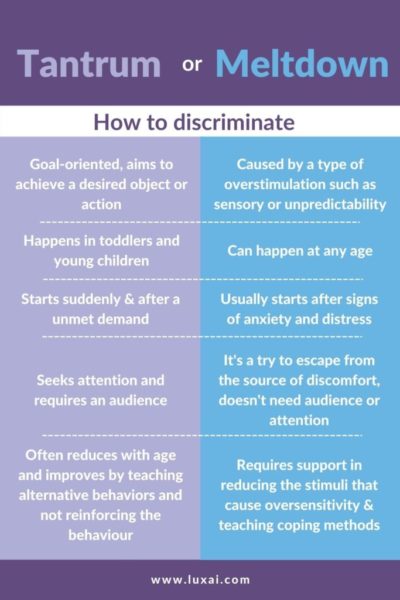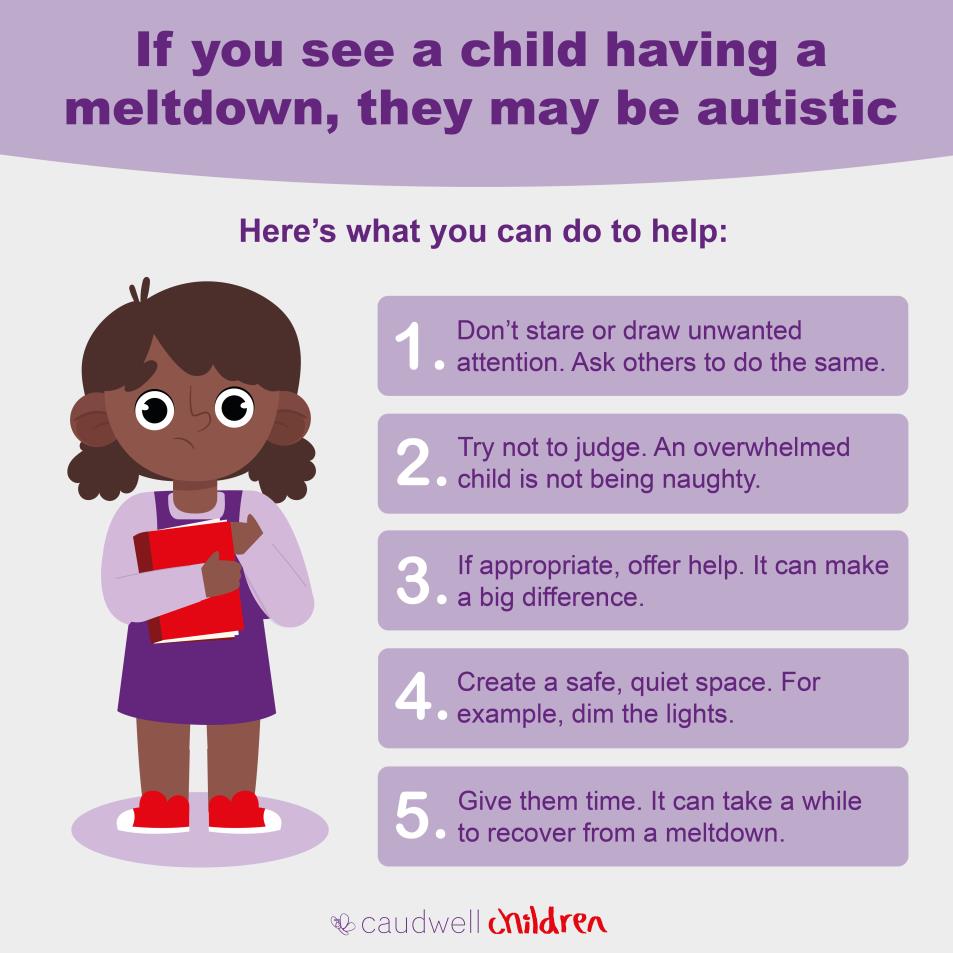
An autistic meltdown may appear to outsiders as an exaggerated tantrum. They frequently entail stimming activities, such as repeated rocking, and are preceded by indications of discomfort or worry. During a meltdown, some autistic youngsters hide in a tiny, contained room elope, or run away. However, Autism meltdowns are different from usual temper tantrums. Read on to learn the distinction between a meltdown and a tantrum as well as how to support someone going through a breakdown.
What Is Autistic Meltdown?
An involuntary reaction to nervous system overload is an autistic meltdown. This severely dysregulated condition is a physical representation of a neurobiological reaction rather than a behavioral one. An autism meltdown in a young kid resembles a temper tantrum, although it can be more severe. After all, the catastrophic release of radioactive material in a nuclear power plant is where the phrase ‘meltdown’ originates. Meltdowns associated with autism are not exclusive to young children. Meltdowns can occur in older children, teenagers, and adults with autism, even in people with modest support requirements referred to as high functioning.
How Is an Autistic Meltdown Different From a Temper Tantrum?
Compared to a temper tantrum, an autistic meltdown is larger, more intense, lasts longer, and is more challenging to control. Meltdowns and tantrums have various origins as well.

When a youngster throws a tantrum, it's usually an attempt to manipulate them into getting what they want by sobbing, yelling, or creating a commotion. On the other hand, autistic meltdowns are sincere expressions of distress rather than manipulation.
What Are The Early Warning Signs Of A Meltdown?

Here are some of the meltdown sins you need to pay attention to for autistic children and teenagers:
Finger flicking, humming, rocking, and pacing are examples of stimuli. In the lead-up to a meltdown, stalling is also typical and can get worse as the anguish grows. An impending meltdown may be indicated by intense stimming, such as vigorous rocking, slamming the palm into the forehead, or other overt displays of irritation.
When faced with excessive sensory input, tension, or anxiety, an autistic person may just bolt from the room to get away from the stimuli. Bolting can be an excellent coping strategy, but it can also be risky if the youngster or adult isn't aware of things like approaching traffic.
Symptoms Of An Autistic Meltdown
Autistic meltdowns might vary in intensity but they include the following:
After the initial trigger has been removed, autistic meltdowns frequently continue for at least 20 minutes. Regaining control over their behavior can be a long process for an autistic individual. Give them room and time to learn how to control their emotions again.
3 Ways To Prevent Autistic Meltdown
Here are 3 strategies to help autistic children and teenagers avoid meltdowns:
1. Recognize Their Triggers
One typical cause for meltdowns is sensory overload. Lights, noises, fragrances, and even textures—like the seams in socks—can all be examples of this. Meltdowns can also be brought on by stress and emotional overload. You can discover solutions to prevent or lessen your child's triggers if you are aware of them. Here are some practices you can implement:
2. Heed The Warnings
Be alert for the telltale symptoms of overwhelm and take appropriate steps to address the issue or relocate the kid to a more tranquil area. Anxiety, anger, and stimming are indicators of developing distress. Older children might be able to express that they are feeling overburdened. Act if you see these indicators.
A young person with social anxiety may require help, confidence, and clear guidance. A meltdown is nearly certain if an intervention doesn't take place or doesn't resolve the issue since the person will be overcome by their feelings.
3. Develop Coping Strategies
This has to do with letting your child know what makes them feel at ease and composed under pressure. Some strategies for handling challenging circumstances are as follows:
Help Your Students Overcome Meltdowns
An instinctive reaction to overwhelm, whether it be sensory or emotional, is an autism meltdown. They can occur at any age, and it will take the youngster at least twenty minutes to settle down. By pursuing Autism Courses for Teachers you can become a composed and understanding adult during a meltdown and experiment with various soothing techniques until you discover the ones that work. You may also assist your child in regaining emotional control.
We believe education should be accessible for everyone. That’s why we don’t charge for our blogs. Find the right course that will help you in your career with us, contact us at - 91-6292150868. You can mail us at act@asiancollegeofteachers.com
Get In Touch
UK – Registered OfficeAsian College Of Teachers Ltd (UK)
27, Old Gloucester Street, London – WC1N 3AX, UK
UK Toll Free: 0-808-189-1203
www.asiancollegeofteachers.co.uk
All SEN Courses are designed, developed and created by Asian College of Teachers Ltd, United Kingdom. These courses are certified by CPD Certification Service UK and endorsed by NCC Education, UK, and Short Courses from CACHE, UK through Laser Learning UK.
Asian College of Teachers (ACT) undertakes a continuous review of its teacher training courses to ensure imparting high quality education. However, there might be circumstances outside of ACT’s control which might affect its stakeholders like if you are planning to teach in a different country, applying for a teaching license, pursuing higher studies or trying to get the certificate approved by the Ministry of Education (MoE) of a particular country then you can do so with the certificate issued by Asian College of Teachers (ACT). However, each country’s Ministry of Education (MoE) or educational bodies set certain standards that are indispensable for the pursuit of higher studies or teaching in schools in that country. So it can be a possibility that you may be able to use the certificate for higher studies or teaching purposes in one country and not in another. Therefore, we strongly recommend that you investigate thoroughly and check with the relevant authorities regarding the acceptance of the certificate issued by us before you enrol on a particular course. ACT strives to offer high-quality education and its certificates can be valuable for various purposes internationally, but still it is crucial for individuals to verify the specific recognition of the certificate in the country they intend to use it, especially for formal education or professional licensing purposes. This approach ensures that the stakeholders make informed decisions regarding their educational and career paths.
© 2025 Asian College of Teachers. All Rights Reserved. Asian College Of Teachers is a trading brand of TTA Training Pvt. Ltd (India) - CIN U80902WB2016PTC215839, Asia Teachers Training Co., Ltd (Thailand) - Registration No. 0105558193360, Asian College Of Teachers Ltd (UK) - Company Number 9939942 & Asian College Of Teachers LLC, (USA) - Federal Tax Identification Number 30-1261596
Designed by kreativewebtech